Want to know more about the Best Schools For Marine Biology In the US and make an informed decision? Here is a good place to start.
Are you a budding marine biologist with dreams of exploring the depths of the ocean? Well, you’re in luck! We’ve dived into the depths of academia to find the best schools for marine biology.
Whether you’re interested in studying the tiniest plankton or the largest whales, these schools are sure to make a splash in your education. So put on your wetsuit, and let’s dive in!
Please note that schools are selected based on our criteria (at the end of the article), ranked by the latest acceptance rate.
Table of Contents
#25. University of Georgia


- Acceptance rate: 98%
- Average entry score: 1270-1450 SAT or 29-33 ACT
- Student-to-faculty ratio: 17 to 1
- Estimated cost of attendance (tuition and fees): $27,958-$46,998
- Average earning potential for graduates: $21,614 (College Factual)
Marine biology majors at the University of Georgia have access to world-class facilities and resources. Students can work with leading researchers in fisheries science, marine mammal biology, coastal ecology, and conservation biology.
The university also has strong partnerships with government agencies such as the National Oceanic and Atmospheric Administration (NOAA).
Students also enjoy close-knit and supportive student communities, as well as a wide range of opportunities for research and internships. Through their degree programs, students learn how to study marine life in its natural habitat.
#24. Alaska Pacific University


- Acceptance rate: 91%
- Average entry score: 830-1115 SAT or 17-26 ACT
- Student-to-faculty ratio: 8 to 1
- Estimated cost of attendance (tuition and fees): $24,220
- Average earning potential for graduates: $47,700 (USNews.com)
Alaska Pacific University’s marine and environmental science degree program offers students the chance to study in one of the most remote and beautiful places on earth. The university is located in downtown Anchorage, Alaska, which makes it an ideal place to study marine biology.
With cutting-edge facilities and equipment, students will have access to all the tools they need to conduct fascinating research projects. Graduates of this program are equipped with the skills they need to pursue careers in fields like marine biology, environmental science, and oceanography.
You might also like:
- Top 17 Famous Marine Scientists That You Should Know
- 25 Best Medical Schools In The US 2024
- Top 30 Majors Most Likely To Change The World In The Next Decade
- Top 15 Famous Pacific Islander Scientists You Should Know
- 10 Highest Paying Earth Science Jobs to Consider
#23. California State University

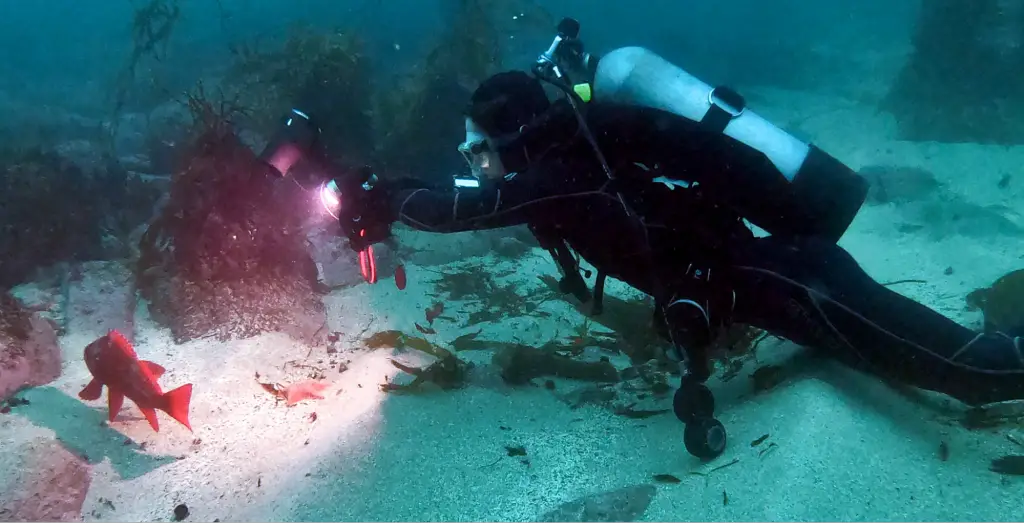
- Acceptance rate: 90%
- Average entry score: 880-1100 SAT or 17-22 ACT
- Student-to-faculty ratio: 24 to 1
- Estimated cost of attendance (tuition and fees): $22,325-$28,463
- Average earning potential for graduates: $26,673 (College Factual)
Due to its proximity to the ocean and strong marine science program, the university is considered one of the best places to study marine biology. The school has a number of research centers that focus on various aspects of marine sciences.
They include aquaculture, coastal management, and ecosystem-based fisheries management.
California State University provides an undergraduate education for students who want to work toward a bachelor’s degree. The school also offers graduate programs in marine sciences, which prepare students for careers in research and teaching.
You might also like:
- 10 Highest Paying Genetics Jobs You Might Not Know 2024
- 10 Highest Paying Chemistry Jobs to Consider 2024
- Top 17 Famous Marine Scientists That You Should Know
- We Help scientists make more impact
- Top 16 Famous Shark Scientists That You Should Know
#22. Auburn University


- Acceptance rate: 85%
- Average entry score: 1170-1350 SAT or 24-30 ACT
- Student-to-faculty ratio: 20 to 1
- Estimated cost of attendance (tuition and fees): $32,678-$52,838
- Average earning potential for graduates: $30,000 (College Simply)
Auburn University’s marine biology students begin their studies with a broad-based curriculum that provides foundational knowledge in marine sciences.
They then move on to specific courses in marine biology, oceanography, and environmental science. This helps them develop their knowledge of the marine environment and its inhabitants. Auburn University also offers students hands-on experience through internships at local research facilities.
At the end of the 4-year course, students will have a strong background in marine biology. They’ll also have a thorough understanding of the environmental issues facing our planet today.
Similar articles like this:
- 25 Best Schools For Agricultural Sciences In The US
- 25 Best Schools For Renewable Energy Degrees In The US
- 25 Best Engineering Schools In The US
#21. Samford University


- Acceptance rate: 83.9%
- Average entry score: 1070-1250 SAT or 23-29 ACT
- Student-to-faculty ratio: 13 to 1
- Estimated cost of attendance (tuition and fees): $52,514
- Average earning potential for graduates: $36,483 (Zippia)
Marine science students at Samford University benefit from a strong foundation in the sciences. This course allows future marine biologists to understand the biological principles behind oceanography and marine biology.
Students will also have the opportunity to gain hands-on experience through internships and field study opportunities.
Samford University’s marine science program places a strong emphasis on the environment. It allows upcoming scientists to develop a more holistic understanding of how they can make an impact on the world around them.
You might also like:
- 25 Best Zoology Schools In The US
- 25 Best Schools For Health Sciences Degrees In The US
- 25 Best Schools For Agricultural Sciences In The US
- Best Schools
- 25 Best Engineering Schools In The US
#20. University of Oregon

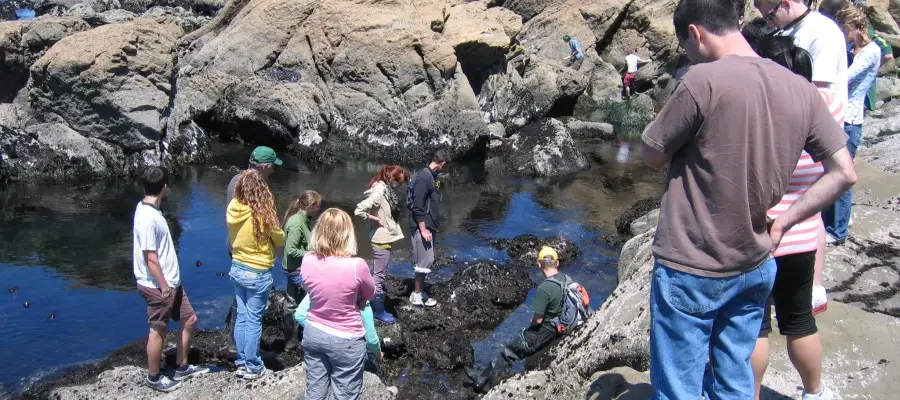
- Acceptance rate: 82%
- Average entry score: 1110-1330 SAT or 22-30 ACT
- Student-to-faculty ratio: 18 to 1
- Estimated cost of attendance (tuition and fees): $31,091-$56,543
- Average earning potential for graduates: $26,100 (College Simply)
The University of Oregon’s Marine Biology major offers rigorous field-based learning at the Oregon Institute of Marine Biology.
Specialized coursework and research opportunities are also available for students interested in graduate studies.
A degree in Marine Biology from the University of Oregon can lead to increased salary and employment opportunities. It also provides a solid foundation for further studies.
You might also like:
- 10 Highest Paying Zoology Jobs To Consider
- Top 30 Majors Most Likely To Change The World In The Next Decade
- Top 16 Famous Shark Scientists That You Should Know
- 25 Best Zoology Schools In The US
- Top 17 Famous Marine Scientists That You Should Know
#19. St. Mary’s College of Maryland


- Acceptance rate: 79%
- Average entry score: 1070-1280 SAT or 23-29 ACT
- Student-to-faculty ratio: 10 to 1
- Estimated cost of attendance (tuition and fees): $31,363-$47,439
- Average earning potential for graduates: $25,100 (College Simply)
With several top-level resources, St. Mary’s College of Maryland is a premier college for marine science majors. The school has various facilities students and faculty use, including a Bay Research Reserve and the Chesapeake Biological Laboratory.
These resources provide students with hands-on experience in many areas of marine science research, including ecology, geology, and zoology.
St. Mary’s College of Maryland also has an extensive marine science research facility at the Horn Point Environmental Laboratory that provides students with opportunities to collaborate with other scientists on projects.
You might also like:
- 25 Best Zoology Schools In The US 2024
- Best Schools
- 25 Best Multidisciplinary Schools In The US 2023
- 25 Best Pharmaceutical Sciences Schools In The US
- 25 Best Schools For Agricultural Sciences In The US 2023
#18. Nova Southeastern University


- Acceptance rate: 76%
- Average entry score: 1070-1280 SAT or 20-30 ACT
- Student-to-faculty ratio: 17 to 1
- Estimated cost of attendance (tuition and fees): $54,686
- Average earning potential for graduates: $17,900 (College Simply)
NSU offers a bachelor of science degree in marine biology to help students gain a detailed understanding of the biological, chemical, and physical processes that occur in the ocean.
The program is designed to be flexible, so you can customize it based on your interests, whether they’re related to marine mammal biology or coral reefs. You’ll also get access to research opportunities that will give you real-world experience in marine biology.
As a graduate of the program, you’ll be well-equipped to pursue a career in the marine sciences. You may also choose to continue your education with a master’s degree in this field.
Similar articles like this:
- 25 Best Forestry Schools In The US
- 25 Best Schools For Environmental Science In The US
- 25 Best Schools For Health Sciences Degrees In The US
#17. University of Maine

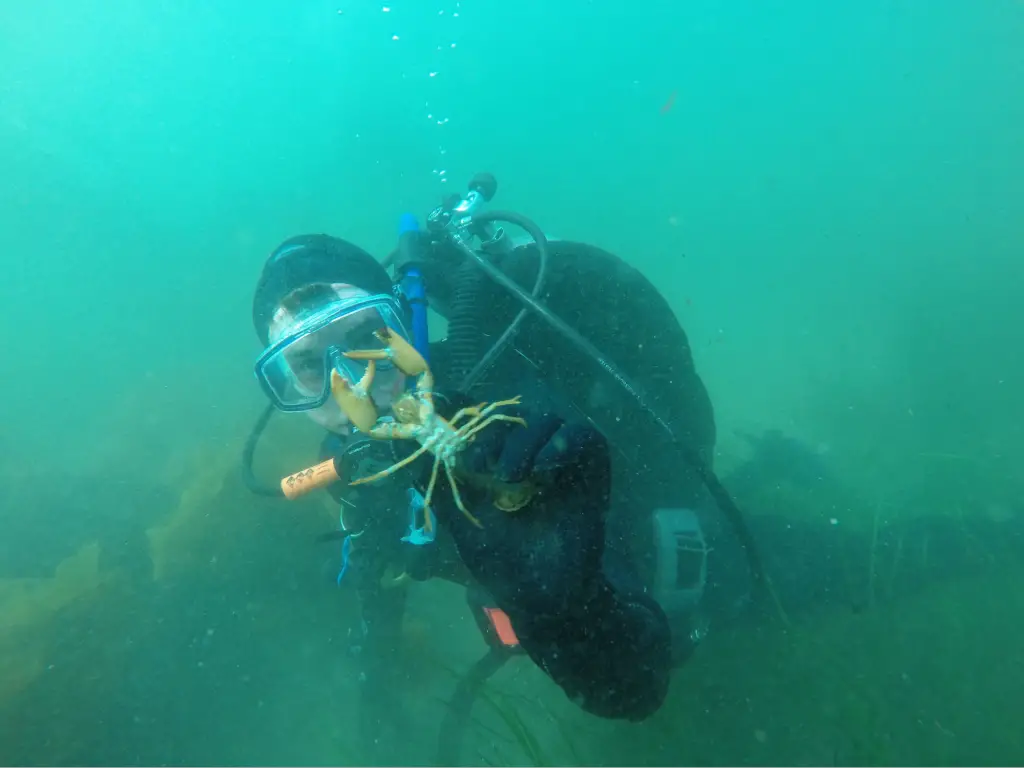
- Acceptance rate: 74%
- Average entry score: 1070-1280 SAT or 22-30 ACT
- Student-to-faculty ratio: 16 to 1
- Estimated cost of attendance (tuition and fees): $26,760-$48,360
- Average earning potential for graduates: $26,700 (College Simply)
Marine science students take courses that provide a comprehensive understanding of the principles and methods used in marine science. They also develop a strong background in the biology and ecology of marine organisms, as well as oceanographic processes.
The university’s faculty are actively engaged in research that contributes to our understanding of the world’s oceans and how they function. Therefore, students learn from experienced scientists who have a wide range of interests and expertise.
Most graduates of the program go on to work in government agencies, research labs and private companies. The university also hosts an annual marine science conference that brings together researchers from around the world.
You might also like:
- Top 17 Famous Marine Scientists That You Should Know
- 25 Best Zoology Schools In The US
- National Sun Yat-sen University, College of Liberal Arts
- Top 30 Majors Most Likely To Change The World In The Next Decade
- Top 16 Famous Shark Scientists That You Should Know
#16. Texas A&M University


- Acceptance rate: 70%
- Average entry score: 1160-1390 SAT or 25-31 ACT
- Student-to-faculty ratio: 21 to 1
- Estimated cost of attendance (tuition and fees): $30,608-$58,976
- Average earning potential for graduates: $26,047 (College Factual)
Texas A&M University offers a deep insight into the world of marine science through its undergraduate degree in marine biology. The program provides students with a broad perspective of the field.
This way, students can choose their own career path after graduation. The marine science program at Texas A&M University is one of the most comprehensive in the country, offering students a wide range of opportunities for research, education and fieldwork.
Many graduates pursue advanced degrees in marine science and continue to work in the field. Other graduates use their knowledge and skills to land jobs with companies that specialize in ocean sciences or environmental protection.
You might also like:
- 25 Best Zoology Schools In The US
- 25 Best Schools For Aerospace Engineering In The US
- Top 17 Famous Marine Scientists That You Should Know
- Top 30 Majors Most Likely To Change The World In The Next Decade
- 10 Highest Paying Forestry Jobs to Consider
#15. Syracuse University


- Acceptance rate: 69%
- Average entry score: 1180-1380 SAT or 27-32 ACT
- Student-to-faculty ratio: 15 to 1
- Estimated cost of attendance (tuition and fees): $77,896
- Average earning potential for graduates: $26,042 (College Factual)
The biology program at Syracuse University prepares future scientists for careers in marine biology, environmental science, and other related fields.
Students receive hands-on experience in the laboratory and in the field. They study aquatic environments plus the organisms inhabiting these areas.
This degree will provide you with the necessary skills to enter the workforce or continue to graduate school.
#14. San José State University University

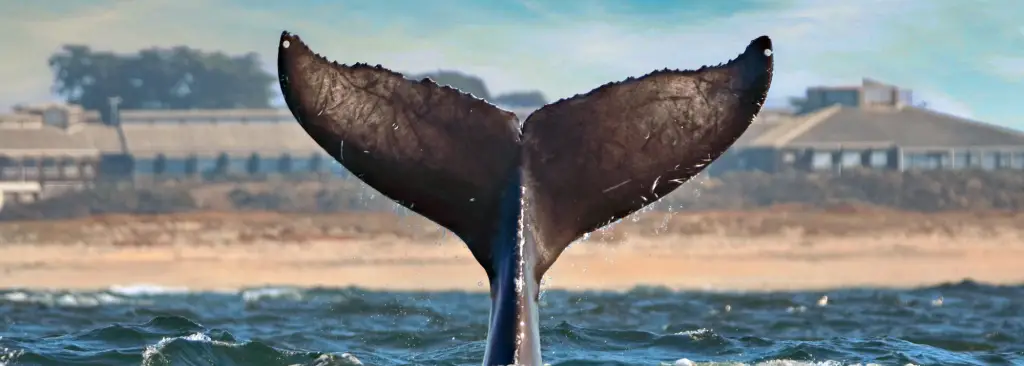
- Acceptance rate: 67%
- Average entry score: 1020-1260 SAT or 21-29 ACT
- Student-to-faculty ratio: 25 to 1
- Estimated cost of attendance (tuition and fees): $25,355-$34,859
- Average earning potential for graduates: $39,200 (College Simply)
SJSU’s marine biology program is ideal for students who want to study marine life in a more hands-on way than other universities. Students take advantage of the university’s close proximity to Monterey Bay and its many marine science facilities.
These future marine scientists acquire a solid foundation in the sciences and gain experience performing research in some of the best facilities in the country.
Graduates are prepared to enter a variety of fields, including research, education and conservation. The program’s curriculum emphasizes on-site fieldwork and laboratory experience in order to provide students with the necessary skills needed for success in this competitive field.
Similar articles like this:
- 25 Best Immunology Schools In The US
- 25 Best Microbiology Schools In The US
- 25 Best Education Schools In The US
#13. University of California, Santa Cruz


- Acceptance rate: 65%
- Average entry score: 1400 SAT or 31 ACT
- Student-to-faculty ratio: 23 to 1
- Estimated cost of attendance (tuition and fees): $38,657-$68,411
- Average earning potential for graduates: $31,500 (Grad Reports)
UCSC introduces students to the field of marine biology with an interdisciplinary approach based on the study of marine ecosystems. The program emphasizes learning from hands-on experience. You’ll have access to numerous research vessels and aquaria available for student use.
Students also get to work closely with faculty members who are experts in their fields. Overall, this program aims to help you gain a unique understanding of the marine environment while also providing you with the skills necessary to succeed in this field.
#12. Florida International University


- Acceptance rate: 54%
- Average entry score: 1060-1240 SAT or 21-27 ACT
- Student-to-faculty ratio: 21 to 1
- Estimated cost of attendance (tuition and fees): $23,376-$35,774
- Average earning potential for graduates: $18,353 (College Factual)
FIU’s Biscayne Bay campus houses the university’s marine biology program. It combines a strong science curriculum with hands-on training in the lab. Students learn about marine ecosystems and how to monitor them for changes that could indicate environmental degradation.
FIU’s marine biology graduates are qualified for entry-level jobs in environmental monitoring, research, and management. They are also ready to pursue advanced degrees in marine science or related fields such as oceanography and conservation biology.
#11. Maine Maritime Academy


- Acceptance rate: 52%
- Average entry score: 1000-1160 SAT or 19-25 ACT
- Student-to-faculty ratio: 9 to 1
- Estimated cost of attendance (tuition and fees): $29,148-$44,068
- Average earning potential for graduates: $32,570 (Grad Reports)
Maine Maritime Academy combines the best of a maritime college and a university. The school offers an array of degree programs in marine biology, including bachelor’s degrees in marine science and environmental science.
This school also has graduate degrees for those who want to continue their education after earning their undergraduate degree.
Students can also earn certificates in various fields of marine sciences, such as aquaculture or coastal management.
#10. University of Washington


- Acceptance rate: 46%
- Average entry score: 1220-1470 SAT or 29-34 ACT
- Student-to-faculty ratio: 9 to 1
- Estimated cost of attendance (tuition and fees): $30,640-$58,470
- Average earning potential for graduates: $32,362 (College Simply)
Study marine biology in the sun-kissed Pacific Northwest at the University of Washington. This unique program will prepare you for a career as a marine biologist or other related fields in the sciences.
You’ll be able to study both marine biology and oceanography, giving you a well-rounded understanding of the complex interrelationships between organisms, their environment and the earth itself.
The program is suitable for students with little or no experience in biology who want to pursue careers in science fields.
Similar articles like this:
- 25 Best Material Science Schools In The US
- 25 Best Schools For Math In The US
- 25 Best Medical Schools In The US
#9. University of California, Santa Barbara

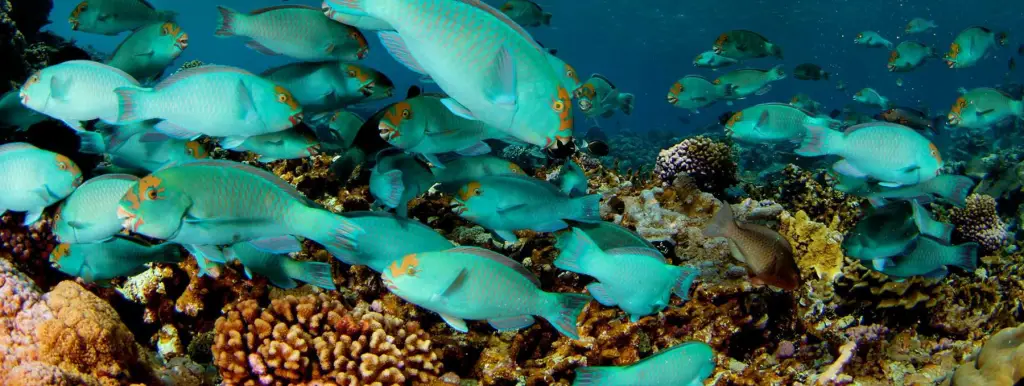
- Acceptance rate: 37%
- Average entry score: 1230-1460 SAT
- Student-to-faculty ratio: 17 to 1
- Estimated cost of attendance (tuition and fees): $37,415-$67,169
- Average earning potential for graduates: $30,100 (College Simply)
UCSB’s aquatic biology undergraduate degree is perfect for students who want to combine their interests in the natural sciences with a career in marine biology.
The curriculum emphasizes the biological principles that govern ocean ecosystems, including coral reefs, kelp forests and estuaries. Learners also gain hands-on experience through field research projects at local marine sanctuaries and laboratories.
They learn how to apply their knowledge to solve climate change, coastal pollution, and other environmental problems.
#8. University of Florida

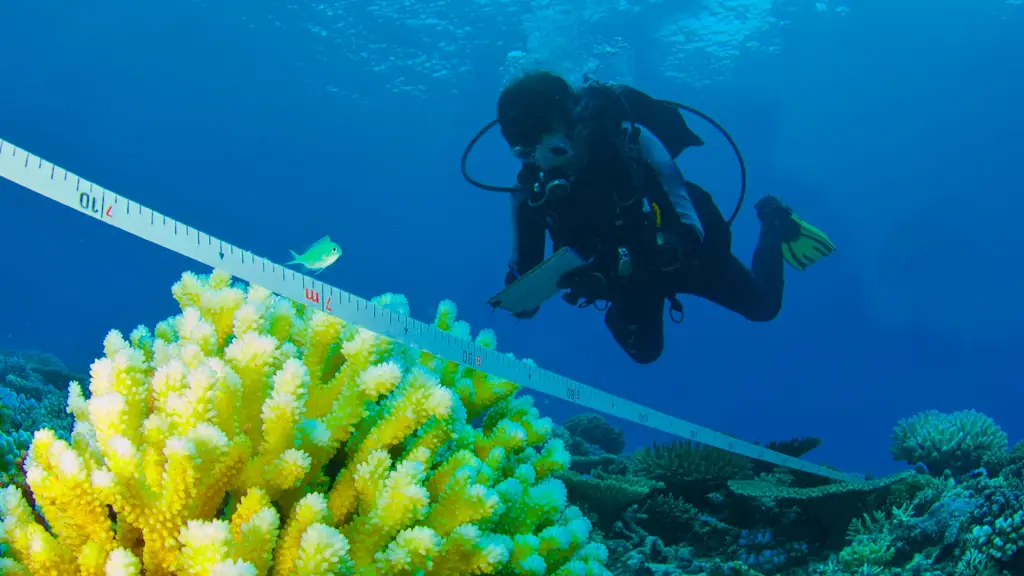
- Acceptance rate: 29%
- Average entry score: 1300-1470 SAT or 29-33 ACT
- Student-to-faculty ratio: 18 to 1
- Estimated cost of attendance (tuition and fees): $21,430-$43,708
- Average earning potential for graduates: $21,800 (College Factual)
UF incorporates the latest developments in marine science into its curriculum. This means you’ll be able to take courses in topics such as coastal engineering, coastal management and marine renewable energy.
You’ll also have the opportunity to conduct research with faculty members who are experts in their fields.
With its proximity to the coast and its extensive marine science facilities, UF offers students an ideal environment for studying oceanography. Students can work on projects related to sea turtles and manatees, among other animals.
This way, students can gain experience working with real-world data and specimens.
#7. University of Miami


- Acceptance rate: 28.5%
- Average entry score: 1320 SAT or 30 ACT
- Student-to-faculty ratio: 13 to 1
- Estimated cost of attendance (tuition and fees): $75,230
- Average earning potential for graduates: $38,100 (College Simply)
The University of Miami offers a Marine biology and ecology degree that gives students a thorough understanding of the marine environment.
Their curriculum covers topics such as biodiversity, population ecology, and marine conservation. Students can gain real-life experience through internships and field study opportunities.
Marine biology graduates from the University of Miami are highly sought after by marine science employers. They can apply their skills to a variety of career paths.
Students may choose to work in government agencies like NOAA or the National Marine Fisheries Service or in private companies that specialize in ocean exploration.
#6. Boston University


- Acceptance rate: 22%
- Average entry score: 1360-1520 SAT or 31-34 ACT
- Student-to-faculty ratio: 11 to 1
- Estimated cost of attendance (tuition and fees): $79,606
- Average earning potential for graduates: $31,600 (College Factual)
BU offers marine biology courses for undergraduate and graduate students in the College of Arts and Sciences.
These world-class courses are taught by renowned professors in marine science, biology and oceanography.
Students study the physical, chemical, and biological properties of oceans and the effects of human activity on marine ecosystems. The curriculum also includes practical training in research methods through active participation in ongoing projects.
What’s it like to study at Boston University?
Similar articles like this:
- 25 Best Multidisciplinary Schools In The US
- 25 Best Gerontology Schools In The US
- 25 Best Nursing Schools In The US
#5. Harvard University


- Acceptance rate: 18.2%
- Average entry score: 1460-1580 SAT or 33-35 ACT
- Student-to-faculty ratio: 7 to 1
- Estimated cost of attendance (tuition and fees): $76,963
- Average earning potential for graduates: $43,328 (College Factual)
Harvard University marine biology offers students the chance to learn under the guidance of some of the world’s leading researchers in the field. You’ll get hands-on experience working with faculty members who are available to answer questions and provide feedback on your projects.
The program offers a variety of courses related to marine science, from marine biology and microbiology to oceanography and conservation biology.
As a result, you’ll have a wide range of career options after earning your degree. Graduates may choose to work in marine science-related fields such as oceanography, fisheries management and conservation biology.
What’s it like to study marine biology at Harvard University?
#4. University of California, Los Angeles


- Acceptance rate: 18%
- Average entry score: 1290-1520 SAT
- Student-to-faculty ratio: 18 to 1
- Estimated cost of attendance (tuition and fees): $16,847-$31,949
- Average earning potential for graduates: $25,100 (College Simply)
UCLA’s marine biology major is a four-year program that provides students with the background needed to pursue careers in marine biology, oceanography, fisheries and environmental science.
With modern facilities and research opportunities, the program’s faculty members work with students to help them develop the skills needed for careers in marine biology.
Graduates of UCLA’s marine biology program have gone on to work as researchers, educators and conservationists. Equipped with the knowledge and skills necessary to make a difference in their field, they have gone on to work at universities, research institutions and government agencies.
What’s it like to study biology at UCLA?
#3. Northwestern University


- Acceptance rate: 9%
- Average entry score: 1460-1560 SAT or 33-35 ACT
- Student-to-faculty ratio: 6 to 1
- Estimated cost of attendance (tuition and fees): $83,784
- Average earning potential for graduates: $26,350 (Grad Reports)
Marine biology is one of the many biological sciences programs available at Northwestern University. Students can earn a bachelor of science degree in biology.
At Northwestern University, you can also participate in an undergraduate research program to gain experience working with faculty members on their own projects.
The program includes courses such as evolution, ecology and evolutionary biology, marine microbiology and toxicology.
These biologists are trained to understand the interconnections between organisms and their environment. This way, scientists can develop solutions to problems in marine science.
What is it like to study at Northwestern University?
#2. Brown University


- Acceptance rate: 8.3%
- Average entry score: 1460-1570 SAT or 33-34 ACT
- Student-to-faculty ratio: 6 to 1
- Estimated cost of attendance (tuition and fees): $84,986
- Average earning potential for graduates: $29,060 (Grad Reports)
The biology program at Brown University is designed to allow students to explore their interests and develop a unique program of study. This course comes with a number of benefits for students.
First, it allows them to develop a strong foundation in biology and chemistry that can be applied to any area of study. Second, it gives students the opportunity to explore their interests in marine biology through field research projects and lab experiences.
The marine biology track is intended for students who want to learn about the biology of marine organisms, ecosystems and environments. Graduates boast a strong understanding of the interdependence of biology, chemistry and geology in the marine environment.
What’s it like to study at Brown University?
#1. Duke University


- Acceptance rate: 7.4%
- Average entry score: 1480-1570 SAT or 33-35 ACT
- Student-to-faculty ratio: 8 to 1
- Estimated cost of attendance (tuition and fees): $84,517
- Average earning potential for graduates: $22,329 (College Factual)
Although Duke University doesn’t offer a marine biology degree, it does offer a Bachelor of Science in Biology with specializations in the life sciences.
Students who wish to pursue marine biology as a career can take advantage of the school’s extensive facilities for studying marine life.
Duke’s biology program has a strong track record of placing graduates in medical school and other graduate programs.
The program also offers students the opportunity to participate in field research trips with faculty members. Through these experiences, students can learn more about marine biology while earning course credit.
What’s it like to study at Duke University?
Conclusion
Settling for the best schools for marine biology can have a significant impact on your education and future career prospects.
Marine biology is a fascinating field of study that offers students the opportunity to explore the diversity of life in our oceans and gain a deeper understanding of the complex relationships between marine organisms and their environment.
Attending a top-ranked school for marine biology can provide you with access to state-of-the-art research facilities, a supportive and social student body, and experienced faculty members who can guide you toward your academic goals.
Selection Criteria
Here is a list of the factors we considered when selecting the best schools for marine biology in the US:
Please note that the order in this list might vary by ranking criteria and sources.
- Reputation and ranking of the school: We looked for schools that have a strong reputation and high ranking in the field of marine biology.
- Faculty expertise, qualifications, and specialization: We researched the faculty members and their areas of expertise and qualifications to ensure that the school has professors with relevant expertise and specialization in the areas of marine biology that are of interest.
- Curriculum and resources: We evaluated the curriculum to ensure it aligns with students’ interests and career goals and considered the quality of the school’s facilities and resources, such as labs, equipment, and libraries.
- Opportunities for hands-on learning and research: We looked for schools that provide opportunities for hands-on experience through internships, co-op programs, or fieldwork.
- Student support services and alumni network: We considered the availability of support services and the strength of the alumni network in providing mentorship, internships, and job opportunities after graduation.
- Extracurricular activities and diversity: We evaluated the availability of extracurricular activities and clubs that align with students’ interests and considered the school’s diversity and inclusivity.
- Networking and post-graduation support: We researched the school’s network of alumni and their post-graduation support for geology students and also considered if the schools have a strong network of industry professionals and researchers in the field of marine biology.
Frequently Asked Questions
Q1. What is marine science, and what does it involve?
Marine science is the study of the ocean, its organisms, and the processes that govern it. It is an interdisciplinary field that combines aspects of biology, chemistry, geology, physics, and environmental science to understand the complex systems that exist in the marine environment.
Some of the topics studied in marine science include oceanography, marine ecology, marine conservation, marine biology, marine geology, and marine technology.
Marine scientists work to understand the complex interactions between organisms and their environment, the impact of human activities on the marine environment, and the potential for sustainable use of marine resources.
Q2. What are the best marine biology colleges in the US, and what are their admission requirements?
There are several top schools for marine science in the US. Some of the best schools include:
- University of California San Diego
- University of Miami
- University of Washington
- Texas A&M University
- University of Maine
The admission requirements for these schools may vary, but generally, you will need to submit an application, transcripts, test scores (such as the SAT or ACT), letters of recommendation, and a personal statement or essay.
Some schools may also require an interview or additional materials, such as a resume or research proposal. It’s important to check with each school for their specific requirements and deadlines.
Q3. What kind of academic support services are available for students studying marine science?
Academic support services vary from school to school, but many marine science programs offer resources to help students succeed academically.
The common academic support services include tutoring, study groups, academic advising, career counseling, and workshops on study skills and time management.
Some schools also offer writing centers, math centers, and online resources to help students improve their academic skills.
Q4. What kind of reputation does the marine science program have in the scientific community, and how respected are its graduates?
The best schools for marine science in the US typically have excellent reputations in the scientific community and are highly respected by employers in the field.
To evaluate the reputation of a specific marine science program, prospective students can research the program’s faculty members, their research interests and publications, and the kinds of collaborations and partnerships the school has with other organizations in the field.
Speaking with current students or alumni of the program can also provide valuable insight into the program’s reputation and its graduates’ experiences.
Q5. What kind of career opportunities are available with a degree in marine science?
There are numerous career opportunities available with a degree in marine science. Graduates can pursue careers in research, education, conservation, and management, among other fields. Some common career paths for marine science graduates include:
- Marine Biologist
- Oceanographer
- Marine Ecologist
- Environmental Consultant
The following article provides more information on the types of careers available with a marine science degree.
References
[1] Official Websites
[2] Salary Data from Glassdoor, College Simply, Grad Reports, College Factual, among others
[3] Ranking references including news media such as 2023 Best Colleges with Marine Biology and Oceanography Degrees in America.


